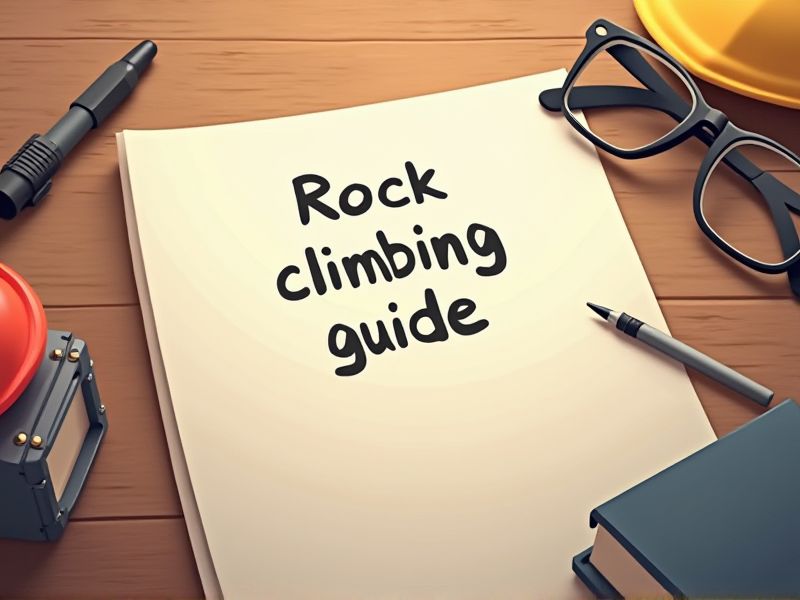
Rock climbing guides face various challenging and unpredictable situations, requiring them to possess critical skills for safety and effective instruction. Certifications validate a guide's ability to manage risks, apply technical knowledge, and lead climbers with proficiency. A guide's credentials ensure they meet high industry standards, which builds client trust and improves job opportunities. Here are some important certifications you may need as a rock climbing guide.
International Federation of Mountain Guides Associations (IFMGA) Certification
The IFMGA Certification ensures that a rock climbing guide possesses comprehensive training in safety protocols, risk assessment, and technical skills essential for high-risk environments. This certification guarantees a standard of knowledge and proficiency, which is crucial for guiding climbers through challenging and varied terrains globally. Rock climbing often takes place in unpredictable and hazardous conditions, and certified guides come equipped with the expertise to manage emergencies and minimize risks. Climbers benefit from the reassurance of reliability and professionalism that IFMGA-certified guides bring, enhancing overall safety and experience.
Wilderness First Responder Certification
A Wilderness First Responder Certification equips a rock climbing guide with essential medical skills to manage emergencies in remote areas. Rock climbing environments often lack immediate access to medical services, increasing the need for valuable first aid knowledge. Accidents such as falls or injuries are more prevalent in climbing settings, necessitating prompt and informed responses. The certification ensures a guide meets industry standards for safety and preparation, instilling confidence among climbers they lead.
CPR/AED Certification
Rock climbing involves significant physical risks, increasing the likelihood of accidents, which can necessitate immediate life-saving interventions. Certified CPR/AED skills equip guides with the ability to respond promptly to cardiac emergencies, potentially stabilizing a climber's condition until professional help arrives. Certification also reassures clients, enhancing trust and perceived safety during guided climbing expeditions. Being certified ensures compliance with industry safety standards, potentially reducing liability for climbing businesses.
American Mountain Guides Association (AMGA) Climbing Guide Certification
The AMGA Climbing Guide Certification sets a standardized benchmark for skills and safety, ensuring guides possess the expertise required for the diverse challenges in rock climbing. Guides who earn this certification are equipped with extensive knowledge, which reduces the risk of accidents and enhances client trust in their capabilities. The certification highlights a commitment to ongoing professional development, keeping guides updated on the latest techniques and technologies. Insurance companies and employers often require this certification as a prerequisite, impacting a guide's employment opportunities and liability coverage.
High Angle Rescue Certification
High Angle Rescue Certification equips rock climbing guides with essential skills to safely manage emergencies in complex vertical environments. Climbing activities inherently carry risk, so guides proficient in rescue techniques can effectively respond to unforeseen situations, reducing potential injuries or fatalities. Guides with this certification demonstrate a commitment to safety, instilling confidence in clients and potentially increasing business. Regulatory bodies and climbing organizations often require such certifications, ensuring that guides adhere to industry standards and legal requirements.
Advanced Rock Climbing Instruction Certification
Advanced Rock Climbing Instruction Certification ensures guides have the necessary skills to handle complex climbing scenarios, increasing safety for climbers. Accreditation enhances a guide's credibility, instilling trust in clients and differentiating them from uncertified competitors. Proper certification equips guides with up-to-date techniques and best practices, reducing the likelihood of accidents. Trained guides can effectively teach climbers, promoting better learning experiences and fostering a stronger climbing community.
Leave No Trace Trainer Certification
Obtaining a Leave No Trace Trainer Certification ensures rock climbing guides can effectively educate others on minimizing environmental impacts in climbing areas. Without proper training, increased foot traffic and climbing activity can lead to soil erosion and habitat degradation. As more climbers visit popular sites, guides with certification play a crucial role in promoting sustainable practices. The certification equips guides with the skills to foster environmental stewardship among both experienced and novice climbers.
Avalanche Awareness Certification
Avalanche awareness certification provides rock climbing guides with essential knowledge about snowpack stability and avalanche terrain, crucial in mountainous environments. Climbing routes often intersect or lie beneath snowfields, where avalanches can pose significant risks to climbers. Understanding avalanche dynamics helps guides make informed decisions, enhancing the safety of their group. Many guiding organizations and insurance policies require this certification to ensure that guides adhere to industry safety standards.
Outdoor Leadership Certification
Outdoor Leadership Certification is crucial for rock climbing guides because it establishes a standardized level of expertise and safety protocols. Certification ensures guides possess essential skills to manage risks and respond effectively to emergencies. It contributes to environmental stewardship, promoting responsible practices that minimize impact on natural climbing sites. The certification process builds trust with clients, assuring them of a guide's competence and professionalism.
Risk Management and Safety Certification
Rock climbing involves inherent risks such as falls, equipment failure, and adverse weather conditions, so risk management is crucial to minimize potential accidents. A safety certification ensures that the guide is proficient in emergency procedures and can handle unforeseen situations effectively. The guide's expertise in risk management contributes to a safer climbing experience, enhancing participant trust and confidence. Insurance companies and regulatory bodies often require safety certifications to validate the guide's competence and compliance with industry standards.
Summary
When you hire a rock climbing guide with certifications, you can expect enhanced safety and professional instruction. Guides with certifications typically have formal training in rescue techniques and risk management. They are likely to offer well-structured climbing plans suited to various skill levels. You might also notice an increase in your own climbing skills and confidence due to their expertise.
